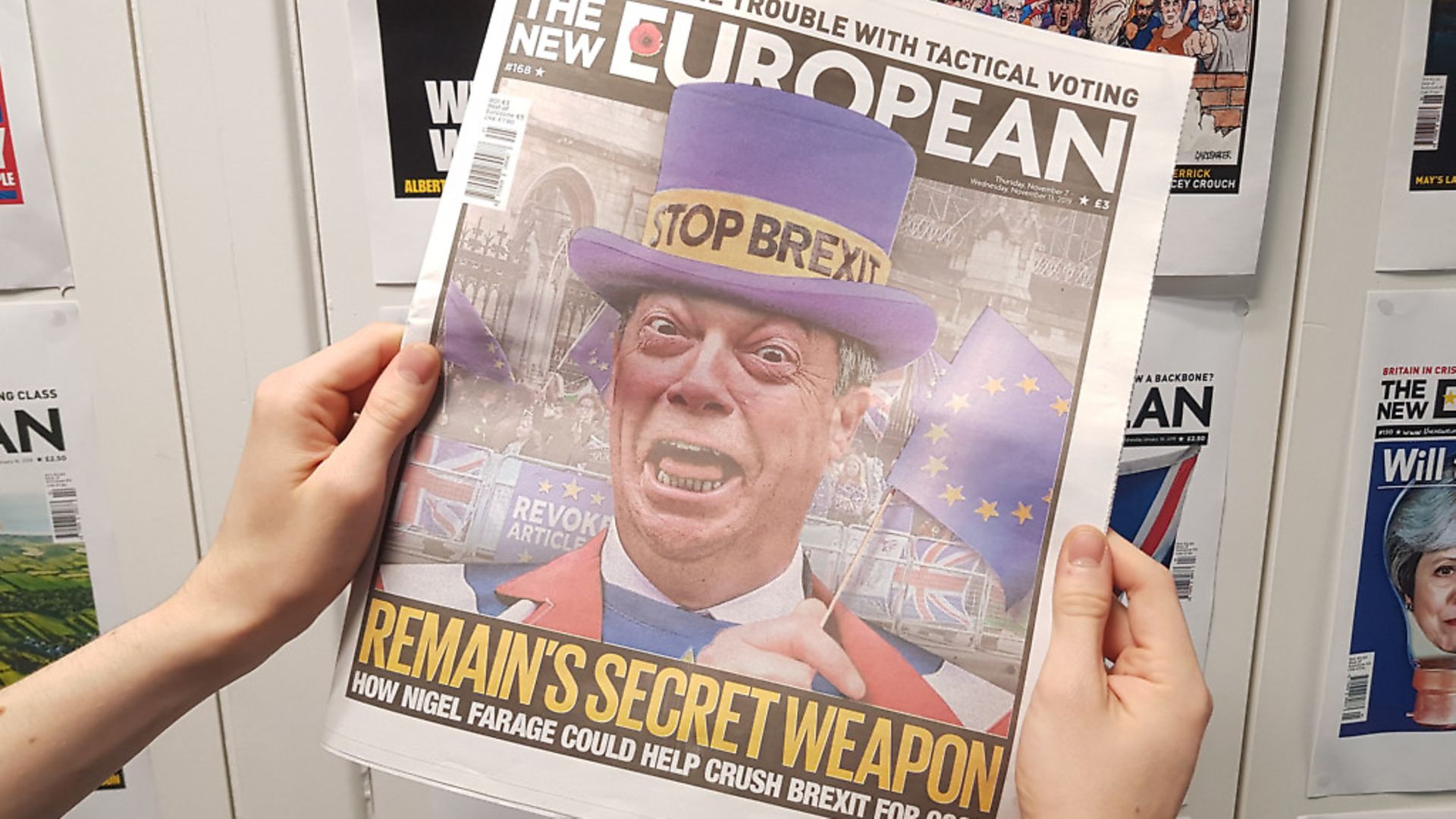
My first encounter with The New European occurred in a supermarket in Godalming, Surrey. It was the front cover that caught my eye: a picture of Theresa May with a Pinocchio nose stretching into the distance.
Upon closer inspection, I discovered a refreshing blend of news, views and features on the arts, culture, politics and sport. What most appealed was the irreverent tone. Here was a newspaper with a confident pro-European, anti-Brexit voice. I felt an immediate kinship.
So when Matt Kelly, TNE’s founder and editor-in-chief, invited me late last year to join a group of investors and advisers, the offer was irresistible. Having spent more than 40 years in journalism, mostly at the Financial Times, I saw an opportunity to help strengthen TNE’s position as a new voice in British media.
In my experience, the European debate in Britain has long been gripped by fatalism: the (false) notion that the UK is a perpetual victim of Brussels and that there is nothing much to be done about public ignorance and prejudice. In my view, the politicians must assume their share of responsibility but so should the British media (and not just the tabloids).
I witnessed the shenanigans first-hand during my six years as the FT’s bureau chief in Brussels (1992-98), where I overlapped with Boris Johnson of the Daily Telegraph. Johnson wrote fantastic tales about new EU regulations banning bendy bananas, interpreters occupying a new “Tower of Babel” and Jacques Delors plotting to build a post-Maastricht European superstate.
The fact that these tall stories made their way into print under Max Hastings, one of the finest newspaper editors of his generation, is a fact easily forgotten, not least because Hastings has since disowned Johnson as an empty shell utterly unfit to be prime minister.
The point is that Johnson’s journalistic legacy of half-truths and inventions lives on today, with one crucial difference.
Brexit has settled the European question for a generation. I see no way the UK can rejoin the EU anytime soon – even assuming that the EU would want us back (which I do not believe to be the case). The ‘war’ is over. But how should we cast the UK’s future relationship with the EU27 and its role in the world? What does the British media have to contribute to this vital question?
A brief survey of the newspaper landscape suggests there is room aplenty for a new voice. With the notable exception of the Daily Mail which has eclipsed the Sun, the tabloids are in steady decline, undone by the digital revolution and the phone hacking scandal.
Johnson’s decision to go for a ‘hard Brexit’, withdrawing from the customs union and the single market, killed at a stroke stories about Brussels interfering in every nook and cranny of British life. True, some will kick up about the EU’s “legal purism” over Northern Ireland, but that’s hardly the stuff of “Up Yours, Delors”.
The same goes for jingoistic campaigns. Even the Daily Telegraph failed to muster much enthusiasm for the British navy’s putative assault on French fishermen off the Channel Islands. Indeed, under the ownership of the Barclay family, the Torygraph has become Johnson’s mouthpiece (or is it the other way round?). Once a foreign correspondents’ paper, it has suffered an exodus of expertise.
The most recent loss was Peter Foster, an outstanding reporter on Brexit, who moved to the FT.
The Times and Sunday Times offer a more nuanced picture. Under John Witherow, now Fleet Street’s longest serving editor, the Times offers unslanted European coverage, top reporting from Westminster and a range of commentary. Simon Nixon, recruited as chief leader writer, is an influential pro-European voice; but I suspect that Witherow’s view (and Murdoch’s) is that Brexit must be made to work and Johnson given a chance.
At the Sunday Times, Emma Tucker (who worked with me in the FT bureau in Brussels), is by instinct a Remainer; but she is new to the editor’s job and knows her political master’s limited tolerance for dissent on political matters. Better focus on the Johnson administration’s own failings, both on Covid and cronyism (which she and her team have done admirably).
To the left, the Guardian remains scarred by the Corbyn intifada. The title has a number of distinguished pro-European journalists led by Jonathan Freedland; but my sense is that majority sentiment cares more about climate change, the culture wars and inequality.
Which brings us to the FT. I took my licks as editor from Paul Dacre’s Daily Mail which derided us as “Remoaners” after the referendum. We stuck to our task of reporting on the economic and political damage wrought by a hard Brexit, drawing on an unparalleled network of Europe-based correspondents.
But the FT remains something of a niche publication in the UK. It is primarily a business and financial news organisation intent on growing worldwide. It does not speak to White Van, let alone Whitehaven Man (or Woman). I will say no more.
Beyond the confines of British newspapers, and readable magazines such as the Spectator, New Statesman and Prospect, there are many promising new voices and outlets offering insights and information about EU-rope (to borrow the neologism of scholar and writer Tim Garton Ash).
Brexit has turned Anand Menon, now at King’s College, London, into the go-to commentator and multimedia performer. His new initiative – the UK in a Changing Europe – has produced excellent work in conjunction with the Institute of Government’s Jill Rutter, a former senior treasury official, Tim Bale and Alan Wager.
Of particular value is their Brexit Witness Archive, a collection of in-depth interviews with ministers and civil servants on the process which led up to the referendum and the grim aftermath.
Such fact-based reporting is a welcome relief from the myths which have so often distorted the European debate in the past.
In sum, I see room for improvement but also optimism. The New European – cheeky, quirky and unapologetic – has created a new space in the British media landscape. And, sans doute, it is here to stay.
Lionel Barber is author of The Powerful and The Damned, life behind the headlines in financial times, published by Penguin
Warning: Illegal string offset 'link_id' in /mnt/storage/stage/www/wp-includes/bookmark.php on line 357
Notice: Trying to get property 'link_id' of non-object in /mnt/storage/stage/www/wp-includes/bookmark.php on line 37







